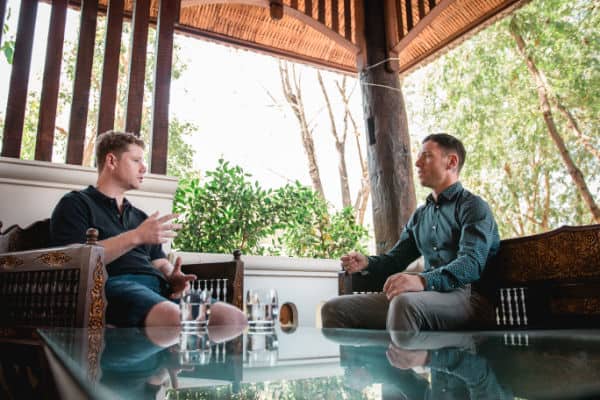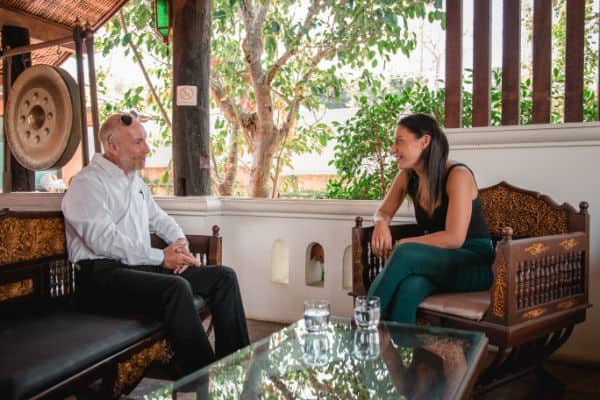Gambling Addiction Treatment at Clarity Rehab in Chiang Mai, Thailand
We treat you as uniquely as your own circumstances.
Gambling Addiction Rehabilitation
and Therapy

When people realise they have a gambling addiction, they often have fears that they attempt to control by repeating certain actions. These actions are called compulsive behaviours, and a lot of people struggle with them.
Proven
methods
Based upon the latest cutting edge gambling addiction treatment.
Long lasting
recovery
Our rehab programme is designed to promote long term recovery.
Resort style
setting
Our incredible facility in the picturesque Chiang Mai, Thailand.
Instant
admission
Gambling Addiction
Most people who gamble occasionally do so for entertainment. They know that they are likely to lose and if they win it is luck. They understand that gambling is a game of chance.
Problem gamblers believe that they can forecast the outcome of a game. They think they can govern chance: if something has not happened for a long time it will eventually happen. They believe that a big win will solve all their problems and that they deserve to win.
Problem gamblers spend more than they can afford to lose. It is no longer entertainment and it replaces all other interests in life. Betting has become a compulsion and the gambler is preoccupied with their next bet, thinking of ways to get money with which to gamble. There are family problems due to arguments, lies and the gambler’s denial. It’s common to become depressed and experience feelings of shame and guilt. The gambler feels isolated and hopeless.
Known as a ‘behavioural’ or ‘process addiction’, gambling eventually leads to serious financial difficulties, problems at work, dysfunctional family life and sometimes suicide. Whether you buy lottery tickets, bet on sports, play poker online or visit casinos, gambling can become compulsive.
- An escape from pressure, stress, or boredom;
- A relief from sadness, loneliness or emptiness;
- An escape from abusive relationships;
- Substituting another addiction: cross-addiction.
- The winning phase
- The losing phase
- Desperation
- Hopelessness
- Spend unlimited time and money on gambling;
- Experience financial problems;
- Chase their losses (after losing money the gambler will return another day to get even);
- Take out frequent loans;
- Be preoccupied with gambling;
- Believe that a win must be about to happen;
- Ask for money from family and friends or steal to fund their habit;
- Pawn belongings to raise funds;
- Lie to friends and family about the extent of their losses;
- Experience mood swings, depression, hopelessness;
- Constantly think about the next bet;
- Become restless or irritable when attempting to cut down or stop gambling;
- Deny the extent of the problem;
- Have had repeated unsuccessful efforts to control, cut back or stop gambling.
Gambling, especially online gambling, is one of the fastest growing addictions in the world today. As gambling addiction progresses, a person’s life becomes focused on the next gambling “fix” and this can lead to desperation, depression and feelings of shame and fear. Unfortunately many gamblers do not seek help until the problem is severe and they are facing financial ruin.
Very often another addiction such as alcohol dependence may co-exist along with gambling and it is essential that these other addictions are also treated.
Cross addiction
Those who have been in recovery from addictions to alcohol or drugs are at risk of cross-addiction. This is when one addiction is swapped for another e.g. gambling. Research suggests that the reward pathways and dopamine receptors of the brain of a recovering alcoholic might be stimulated in the same way by the thrill and rush of gambling.
Are you a problem gambler? Read through this questionnaire
- Do you find that you are preoccupied with gambling (for example, constantly thinking about past gambling experiences, planning the next gambling opportunity, or scheming of ways to get money with which to gamble)?
- Do you need to gamble with increasing amounts of money in order to achieve the desired excitement?
- Have you already made repeated unsuccessful efforts to control, cut back or stop gambling?
- Do you feel restless or irritable when attempting to cut down or stop gambling?
- Do you gamble in order to escape from problems or to relieve unpleasant moods (eg feelings of helplessness, guilt, anxiety or depression)?
- After losing money gambling, do you often return to try and ‘break even’ and recoup your losses (‘chase your losses’)?
- Have you lied to family members, therapists, or others to conceal the extent of your involvement in gambling?
- Have you committed illegal acts such as forgery, fraud, theft, or embezzlement to finance gambling?
- Have you jeopardised or lost any significant relationships, jobs or educational opportunities because of gambling?
- Have you had to manipulate others to provide you with money to relieve desperate financial situations cause by gambling (‘bailout’)?
Gambling rehab help for those suffering from addiction


Treatment for gambling addiction at Clarity
Our registered therapists will only ever deliver treatments that they are qualified in at our national accrediting board. If we ever feel that we are unable to treat your needs through our programmes or there are other options that would meet your needs better, will we always tell you.
- Understand their addiction,
- Recognise the consequences of their addiction,
- Recognise what they want in place of gambling,
- Build self-esteem, assertiveness and impulse control,
- Manage their debts and finances.
How gambling addiction rehab works
- To abstain from alcohol, drugs and gambling,
- To learn relapse prevention strategies,
- To develop a healthy, new lifestyle through a good diet, exercise and creative therapies,
- To rebuild broken relationships with family, friends and colleagues.
Digital detox
Please note that all clients accessing treatment for internet or gaming addictions are closely monitored and undergo a strict digital detoxification programme. During this period contact and communication is restricted and phone use is under strict supervision only. Use of the internet is prohibited as part of the treatment care plan for a period of 2 weeks minimum following admission.
Where to find professional help for online addiction treatment.
Clarity in Chiang Mai, Thailand are able to help with a broad range of non-substance related addictions or dependency disorders. Please get in touch for more information.
24hr onsite medical care
Unique recovery approach
Private & confidential care
Personal support

Why choose Clarity
Clarity offers an incredible healing experience for our clients and their families that is second to none. Our team is comprised of individuals with years of experience who are all here for one reason. To help you realise, achieve, and maintain permanent long term recovery.
- Leading evidence based on clinical programmes
- Resort style setting, providing ultimate comfort in Chiang Mai, Thailand
- Bespoke family support for all affected
Interested in finding out more about Clarity at Home?
Reach out to us today by calling us on: +66 644 922208 or by filling out the form below.